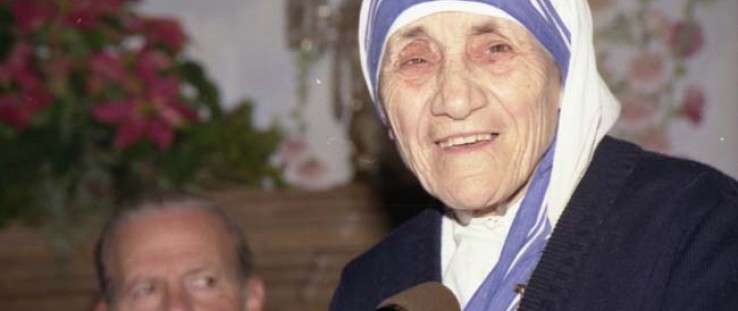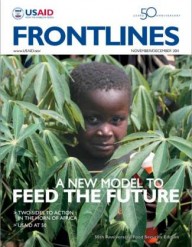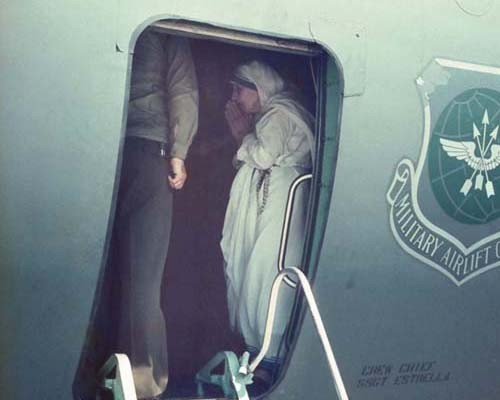 Mother Theresa appears at a State Department ceremony hosted by Secretary of State James Baker, in background, Dec. 8, 1991.
CREDIT: CHRIS HILL
Mother Theresa appears at a State Department ceremony hosted by Secretary of State James Baker, in background, Dec. 8, 1991.
CREDIT: CHRIS HILL
 Mother Theresa appears at a State Department ceremony hosted by Secretary of State James Baker, in background, Dec. 8, 1991.
CREDIT: CHRIS HILL
Mother Theresa appears at a State Department ceremony hosted by Secretary of State James Baker, in background, Dec. 8, 1991.
CREDIT: CHRIS HILL
I had the privilege of serving as the assistant administrator of the Bureau of Europe when the Berlin Wall fell in 1989. From their rebirth as free nations, the countries of Central and Eastern Europe (CEE) were way ahead of many aid recipients.
The Czech Republic called for “trade not aid,” Poland was pushing us to move faster on privatization assistance, and Hungary’s small businesses were coming out of garages all over the country, where stealth entrepreneurs had been hiding them during the communist years.
We were able to help these countries quickly and efficiently due to new legislation, the Support for Eastern European Democracy, or SEED, Act of 1990, which allowed us to write our own streamlined procurement system; gave us the ability to work easily with small U.S. private institutions; and allotted one lump sum of money for all of CEE, thus eliminating country and functional earmarks and allowing us to distribute money based on performance, rather than entitlement.
My golden memory of these years is from Albania, a tiny country of fewer than 3 million people that had been ruled by the last Stalinist dictator, Enver Hoxha. The first USAID team to go there in 1991 came back with eye-opening stories of ether still being used in hospitals, of just 200 cars in the entire country, of dilapidated infrastructure, of the fanciest hotel in the capital city of Tirana offering its premiere guests hot water for one hour each evening, of political prisoners tossed into camps for complaining in bread lines or for listening to Voice of America—and being held there, along with their children, for two or three decades.
When James Baker—the first secretary of state to visit Albania—arrived in the summer of 1991, more than 50,000 Albanians were cheering like mad. In a country that had been completely repressed for a half-century, where the United States had been painted as the devil incarnate, he was welcomed as a hero. I was told that 40 percent of Albanians spoke English, and that a popular name for children was Wilson, after President Woodrow Wilson. Even skeptics of humankind’s innate desire for freedom and democracy understood the message here.
When the newly elected President Sali Berisha was asked how we could best help, he replied: “We have a democratic heart and a democratic head that are stuck in a Bolshevik body.” The 28-year-old Minister of Finance and Economy Genc Ruli was optimistic when describing what he would consider success in the country’s transition from totalitarianism to democracy: “We will be measured by the windows in our shops and how full they will be with goods that people can buy.”
My most interesting exchange with Ruli, however, happened over lunch in King Zog’s palace, which towered over the Adriatic Sea. At our small table, away from his official entourage, Ruli peppered me with questions about America. Was it true that teenagers had their own cars? Were our stores really as long as their airfield in Tirana?
Finally, he leaned forward, looked me in the eye, and asked me in a quiet voice: “Now, what is this tummy tuck?” Thinking about Albania’s food shortage crisis and all its other woes, I said simply: “It’s an operation, Minister Ruli. But, don’t worry; it’s not your problem.”
“Get Them Jobs. Get Them Jobs”
What I remember most fondly from Albania was meeting the most wonderful Albanian, Mother Teresa. When I first spotted her, she was carrying an Albanian child with a club foot and busily talking with the child’s nurses and caregivers. I walked alongside her and Deputy U.S. Secretary of the Treasury John Robson, as she seemed to never stop moving.
Robson and I were there to follow up on Baker’s trip, and to design assistance programs that responded to Albanian needs and desires. While walking with Mother Teresa, I asked her: “What can we do to help Albanians the most?”
She turned and looked up at me straight in the eye, and answered: “Get them jobs. Get them jobs.” She clearly stood for sustainable development, helping people to help themselves.
Food shortages in Albania had reached crisis levels. In response, the U.S. military flew in Meals Ready to Eat (MREs). The first American plane loaded with MREs into Albania landed on a bumpy, grassy runway with peasant women hoeing the adjoining field and goats and cows wandering about.
Mother Teresa joined the hundreds of other Albanians awaiting the plane at this tiny airport. When the military airlift-command crew came out of the cockpit, the Albanians cheered and rushed the plane. They were especially amazed to see that the pilot was a 20-year-old woman.
Mother Teresa stood in a circle with the wide-eyed crew, handing out rosaries and blessing them. Before anyone could notice, she slipped away to the plane, went up the steps, and, standing over the MREs, held her hands in prayer, closed her eyes, and blessed them.
This and other experiences in Albania reminded me, once again, how the United States can help people turn their hopes into reality and how USAID, the State Department, and the U.S. military can work together to help people in need around the world.










Comment
Make a general inquiry or suggest an improvement.